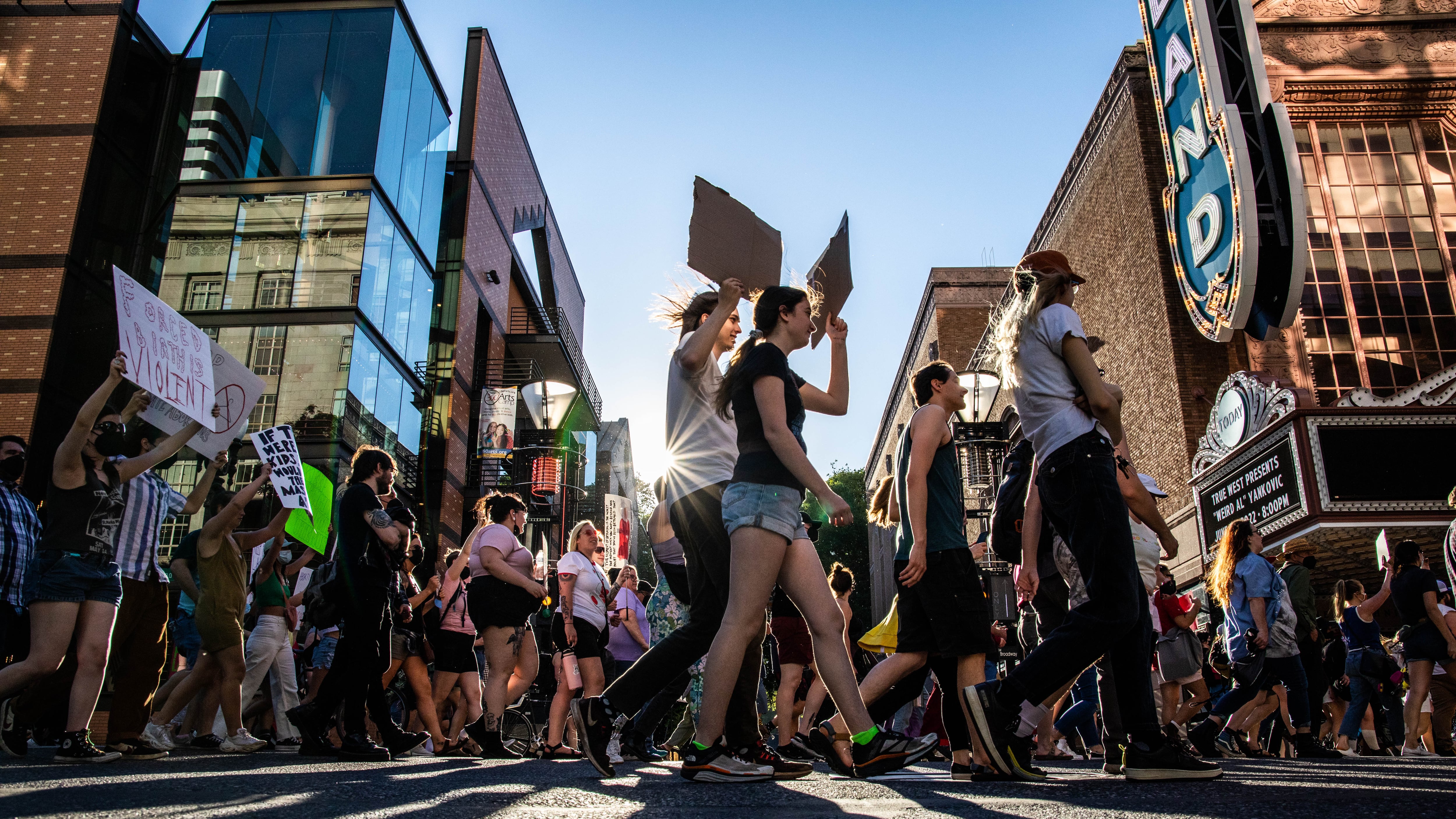Thousands of people took to downtown Portland’s streets early Friday evening, marching in protest against the U.S. Supreme Court’s Dobbs v. Jackson decision to reverse the landmark Roe v. Wade ruling, which will undo 50 years of legal precedence protecting the right to abortion at the federal level.
The June 24 protests—one organized jointly by Planned Parenthood Advocates of Oregon and Pro-Choice Oregon, the second by Portland’s Democratic Socialists of America chapter—mirrored events also staged at Lownsdale Square in early May, when the justices’ rumored decision first leaked to Politico.
Miranda Ounaphom learned SCOTUS’s decision early Friday morning through social media. Ounaphom brought her parents with her to demonstrate. “My friend’s mom is a doctor in Texas, and she says it’s really sad for her to have to go through and tell people that they’re not going to have access to [abortion] services,” Ounaphom told WW.
By the size of the crowd and intensity of the frustration, the march reflected the earliest days after the election of President Donald Trump, when a rightward lurch of the nation was merely a frightening prospect. Friday’s court decision was the consummation of that fear. In the years between, Portland became a national capital of political tumult. But this Friday evening march in a baking sun remained mostly peaceful.
People holding signs decorated with pro-choice slogans and art were still filtering into Lownsdale after 6 pm. Community leaders, health care workers, and political organizers spoke for nearly an hour before most of the crowd broke off to march before 7 pm. Volunteers diverted most traffic at least a block away from the park, but speakers were occasionally drowned out by supportive-sounding honks from passing vehicles. No visible counterprotest, or presence of the Portland Police Bureau, was detected by sunset.
The march densely packed five city blocks at its largest, the rear coiling around Southwest Jefferson Street down Broadway as the front reached Pioneer Square. The march remained mostly nonviolent, with only a few instances of property damage, such as broken Pioneer Place mall windows, a couple of loose fireworks, and spray-painted graffiti. The march looped throughout downtown Portland, at one point crossing the Hawthorne Bridge, with protesters dwindling to hundreds as night fell and speakers left Lownsdale Square. Protesters chanted calls, including “My body, my choice!” and “Fuck SCOTUS!”
By 11 pm, most of the marchers had returned home. A few dozen lit a bonfire in Lownsdale, then occupied Southwest 3rd Avenue in front of the courthouses.
“It made me feel powerless, and it made me feel vulnerable, because if they can decide what to do with my body, what’s next?” said a protester who goes by her first initial, E. “They can decide what to do with my education, they can decide what to do with my parents’ immigration forms—it’s nuts. This was the tip of the iceberg, and it feels surreal. It feels not real.”
Lewis & Clark College students Ashley Hollis, Adelaide Beeman-White, Elexis Kain and Sowmiya (who asked that her last name not be used) discussed the ramifications of SCOTUS’s decision among themselves and with WW. Beeman-White felt SCOTUS is within its right to make the choice it did, clarifying that she does not agree with the decision, while Hollis and Kain dissented and Sowmiya listened.
“This is going to go down in legal history as a ruling that’s comparable to Dred Scott,” Kain said, referring to the racist pre-Civil War SCOTUS ruling that citizenship was not meant for African Americans. “It’s a shameful embarrassment, and it has undermined the people’s confidence in the Supreme Court.”
Beeman-White agreed, also noting Dobbs’ invasive, far-reaching implications.
“If you get an abortion pill shipped to you, you might be prosecuted. Does that mean they will monitor mail? How will that work?” she asked. “If you travel out of state to get an abortion and you get prosecuted for that, do you have to sign a registry every time you have to go out of state, or verify why you’re leaving? Are they going to be investigating all miscarriages? The ramifications for privacy are astronomical.”
0 of 15
